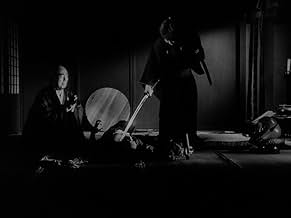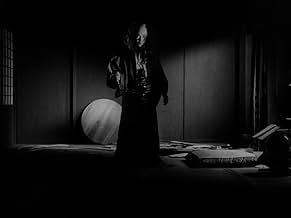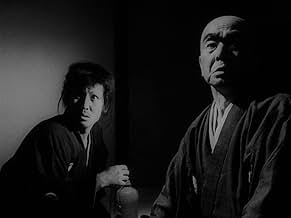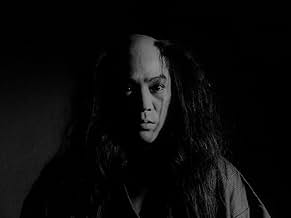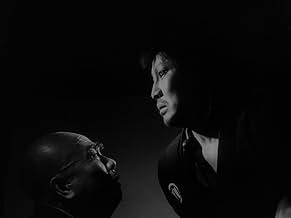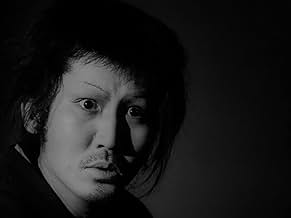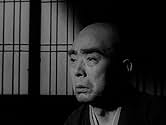Shura
- 1971
- 2 घं 14 मि
IMDb रेटिंग
7.9/10
3.2 हज़ार
आपकी रेटिंग
अपनी भाषा में प्लॉट जोड़ेंAfter being robbed by a geisha, a ronin warrior carves a bloody path to seek revenge.After being robbed by a geisha, a ronin warrior carves a bloody path to seek revenge.After being robbed by a geisha, a ronin warrior carves a bloody path to seek revenge.
- निर्देशक
- लेखक
- स्टार
फ़ीचर्ड समीक्षाएं
A very slow burn of a horror movie. I had no idea what to expect from a Japanese movie from the 1970s. I've seen very few Japanese films overall, and definitely no horror ones.
I honestly have no idea how to contextualize this one. I have absolutely no frame of reference for what I just watched. Certainly unlike any film (that I know of) that was released before this. This makes me want to watch more Japanese films, and definitely more Japanese horror. That is the mark of a great film.
I wasn't sure whether I read the genre properly for this film because the build up is not typical of the genre.
Once it gets going it does not stop. And the circular storytelling is so satisfying. I wasn't feeling this one until it gets to around the halfway point and I realized this wasn't just horror for horror's sake. Really interesting film that I want to revisit someday, probably next October.
Hopefully I'll have a more nuanced understanding of the Japanese film scene by then.
I honestly have no idea how to contextualize this one. I have absolutely no frame of reference for what I just watched. Certainly unlike any film (that I know of) that was released before this. This makes me want to watch more Japanese films, and definitely more Japanese horror. That is the mark of a great film.
I wasn't sure whether I read the genre properly for this film because the build up is not typical of the genre.
Once it gets going it does not stop. And the circular storytelling is so satisfying. I wasn't feeling this one until it gets to around the halfway point and I realized this wasn't just horror for horror's sake. Really interesting film that I want to revisit someday, probably next October.
Hopefully I'll have a more nuanced understanding of the Japanese film scene by then.
The only possible parallel I can furnish to position SHURA in the greater map of Japanese cinema is the last 20 minutes of that soul-destroying masterpiece Kihachi Okamoto directed in 1966, the indomitable SWORD OF DOOM. And even that comparison leaves a little something to be desired. Not only because SHURA is an exhausting 2+ hours of that same brooding sludge so thick you could slice it with a wakizashi, but also because, directed as it is by experimental guerilla rebel Toshio Matsumoto, it stands as a somewhat different beast from the general hobnob of genre cinema.
Woven of that same tragic almost Shakespearian fabric, with a protagonist who like Ryunosuke Tsukue in SWORD OF DOOM finds himself doomed to walk the path of demons in a downward spiral into madness and despair, SHURA is as bleak dark and hopeless a jidaigeki as was ever execrated and sealed from man and beast on celluloid. Unlike Ryunosuke Tsukue, however, who starts on the Great Buddha Mountain Pass and slowly cuts his way into his own private hell, Gengobe in SHURA starts in that private hell and plunges himself deeper in depths of the soul unknown. The movie opens with Gengobe hunted in pitch black by hovering lanterns held by unseen persecutors. He enters a house and finds a scene of carnage and mayhem, the floor strewn with mutilated bodies, limbs, others hanging dead from the ceiling. I told you it only starts there.
The movie itself exists in a hopeless purgatory. No establishing shots of anything. No daytime. The passage of time signaled with intertitles. The occasional external shot, a patch of gravel road, the frontside of a house, offers no relief, no room for breath, because it reminds us that there are no horizons or depth for the eye to rest. Everything was probably shot on soundstages with only a few lights strategically placed hither and thither, no doubt a lingering remnant of kabuki theater from which Japanese cinema has borrowed heavily. With no broader world to be measured against, the interiors and the story that takes place inside and the characters that breathe and walk and double-cross and slaughter each other in them, all seem to hover suspended in absolute suffocating darkness and everlasting night.
The title really says it all. The Ashuras, a rank of lower demigods in Buddhism, are meant to reflect the mental state of a human being obsessed with force and violence, always looking for an excuse to get into a fight, angry with everyone and unable to maintain calm or solve problems peacefully.
It's not only cynic or tragic as the best of jidaigekis usually are, it's positively bleak and unremitting. That shots and entire scenes repeat themselves automaton-like, first taking place inside the protagonist's anguished mind and then reality, only serves to reinforce the existential phlegm through which SHURA wades waist-deep for two hours. The atmosphere is so oppressing that questions of clunky expositional dialogue such as the characters often spout ("this is your wife's head" says a character while brandishing said head in plain sight) and theatrical exaggerated acting are rendered almost meaningless.
The story is still good, gripping, engrossing, as classic and plain and stripped of all fat as the best jidaigekis usually are, with a limited cast and sets that hint at the stageplay origins of the script, but in the end it's the overarching feeling of despair that stays with you. A movie so much of its time and place, almost impossible to even think of it as coming from anywhere else than Japan of the late 60's-early 70's, that will by its very nature appeal only to a limited audience. If you came this far and liked what you read then you're probably ready to brave SHURA. Beware all who enter. There is real cacodemonia here.
Woven of that same tragic almost Shakespearian fabric, with a protagonist who like Ryunosuke Tsukue in SWORD OF DOOM finds himself doomed to walk the path of demons in a downward spiral into madness and despair, SHURA is as bleak dark and hopeless a jidaigeki as was ever execrated and sealed from man and beast on celluloid. Unlike Ryunosuke Tsukue, however, who starts on the Great Buddha Mountain Pass and slowly cuts his way into his own private hell, Gengobe in SHURA starts in that private hell and plunges himself deeper in depths of the soul unknown. The movie opens with Gengobe hunted in pitch black by hovering lanterns held by unseen persecutors. He enters a house and finds a scene of carnage and mayhem, the floor strewn with mutilated bodies, limbs, others hanging dead from the ceiling. I told you it only starts there.
The movie itself exists in a hopeless purgatory. No establishing shots of anything. No daytime. The passage of time signaled with intertitles. The occasional external shot, a patch of gravel road, the frontside of a house, offers no relief, no room for breath, because it reminds us that there are no horizons or depth for the eye to rest. Everything was probably shot on soundstages with only a few lights strategically placed hither and thither, no doubt a lingering remnant of kabuki theater from which Japanese cinema has borrowed heavily. With no broader world to be measured against, the interiors and the story that takes place inside and the characters that breathe and walk and double-cross and slaughter each other in them, all seem to hover suspended in absolute suffocating darkness and everlasting night.
The title really says it all. The Ashuras, a rank of lower demigods in Buddhism, are meant to reflect the mental state of a human being obsessed with force and violence, always looking for an excuse to get into a fight, angry with everyone and unable to maintain calm or solve problems peacefully.
It's not only cynic or tragic as the best of jidaigekis usually are, it's positively bleak and unremitting. That shots and entire scenes repeat themselves automaton-like, first taking place inside the protagonist's anguished mind and then reality, only serves to reinforce the existential phlegm through which SHURA wades waist-deep for two hours. The atmosphere is so oppressing that questions of clunky expositional dialogue such as the characters often spout ("this is your wife's head" says a character while brandishing said head in plain sight) and theatrical exaggerated acting are rendered almost meaningless.
The story is still good, gripping, engrossing, as classic and plain and stripped of all fat as the best jidaigekis usually are, with a limited cast and sets that hint at the stageplay origins of the script, but in the end it's the overarching feeling of despair that stays with you. A movie so much of its time and place, almost impossible to even think of it as coming from anywhere else than Japan of the late 60's-early 70's, that will by its very nature appeal only to a limited audience. If you came this far and liked what you read then you're probably ready to brave SHURA. Beware all who enter. There is real cacodemonia here.
A strangely hypnotic and violent tale of greed, betrayal and revenge, this tale is a masterclass in cinematography and lighting. In fact, this has to be among the best lit films I have ever seen. Set designs are minimal and intersting and so is the story and it manages to hold the attention pretty nicely. The middle section of the film is a bit slow and that could have been worked on but otherwise it's good. The twist at the end works well. All in all, a pretty masterful work of art and a very underrated piece of samurai cinema.
If anyone imagined how a Greek tragedy would look if it was set in feudal Japan, look no further. It is a harrowing, exhausting, depressive experience, but it's worth it. The film follows a once great warrior, now a Ronin (for those unfamiliar, Ronin is a samurai without a master), named Gengobe, who has sold all of his property to repay his debts. He is in love with a geisha who is to be married to a rich lord, unless someone pays 100 Ryō for her liberty. Once he realizes that he was being played by this geisha and her husband, of whose existence he was unaware of, he becomes hell bent on revenge.
The film emits a strange sense of reality distortion. The film begins with a dream sequence, that is somewhat foreshadowing of things to happen. This theme is prevalent throughout the film. We can see things unfolding, only to realize that it was just a thought, or a fantasy of a certain characters. Reality tends to be different, albeit sometimes it can lead to the same conclusion. What was particularly striking was the way the graphic scenes of violence were portrayed. They were slowed down, they almost feel other-wordly, yet these graphic scenes are strangely beautiful. Highly contrasted Black and white cinematography helps this, we see characters illuminated against dark background like phantoms and the black blood coming out of the wounds becomes even more noticeable.
Shura is a tale of vengeance than leads all the parties involved into an abyss of some sort. There is no bright light at the end of the tunnel. Because of mere 100 Ryō, these people have turned into "Demons" and they're lives became "Hell". This film isn't disturbing because of its visual content, but because of its emotional impact. Gengobe isn't a typical hero, the reason why one would want to root for him is because he is an agent of justice (like Monte Cristo), but not because he himself is a virtuous hero worth rooting for. It's easy to hate most, if not all of the characters, but at the same time, it's difficult not to feet pity for them. Seldom comes a film that makes one feel this way.
This film is not for everyone, it's extremely pessimistic, it doesn't offer glimmers of hope. It's not an easy watch, but it's worth it. I highly recommend it to anyone who is interested in film as an art form.
The film emits a strange sense of reality distortion. The film begins with a dream sequence, that is somewhat foreshadowing of things to happen. This theme is prevalent throughout the film. We can see things unfolding, only to realize that it was just a thought, or a fantasy of a certain characters. Reality tends to be different, albeit sometimes it can lead to the same conclusion. What was particularly striking was the way the graphic scenes of violence were portrayed. They were slowed down, they almost feel other-wordly, yet these graphic scenes are strangely beautiful. Highly contrasted Black and white cinematography helps this, we see characters illuminated against dark background like phantoms and the black blood coming out of the wounds becomes even more noticeable.
Shura is a tale of vengeance than leads all the parties involved into an abyss of some sort. There is no bright light at the end of the tunnel. Because of mere 100 Ryō, these people have turned into "Demons" and they're lives became "Hell". This film isn't disturbing because of its visual content, but because of its emotional impact. Gengobe isn't a typical hero, the reason why one would want to root for him is because he is an agent of justice (like Monte Cristo), but not because he himself is a virtuous hero worth rooting for. It's easy to hate most, if not all of the characters, but at the same time, it's difficult not to feet pity for them. Seldom comes a film that makes one feel this way.
This film is not for everyone, it's extremely pessimistic, it doesn't offer glimmers of hope. It's not an easy watch, but it's worth it. I highly recommend it to anyone who is interested in film as an art form.
A stark, desperate tale of vengeance, Shura examines the plight of Gengobe - a Ronin (Samurai without Master) - and his quest to right the wrongs done unto him. This is basically the whole plot in a nutshell, but this isn't any kind of action adventure story or pulp fiction Samurai epic, rather a philosophical and meditative examination of manipulation and a misguided affection which blinds a man from his duty and true quest. True this is a staple of Japanese cinema - but it is one which has rarely been examined quite this painfully and as unflinchingly as it is in this film.
The theatrical origins of Matsumoto's film are very evident from the onset of this bleak piece, an extremely minimalist affair, but this only adds to the feeling of entrapment and claustrophobia. Daylight is glimpsed only once (the first shot as the sun sinks from the blood-red sky - also the only shot in colour) and the story plays out over the course of several nights.
As with his previous film 'Funeral Parade of Roses' Matsumoto employs many times a 'dual reality' device replaying scenes first as the protagonist imagines, and then as it actually happens, constantly keeping the viewer unsettled, with shocking - though never gratuitous - spurts of violence which one is torn between finding sympathy with and being repulsed by.
This is a film which is easier to admire than to actually like, but it's forlorn, doomed and - literally - lightless vision means it could only be truthfully recommended to those who are fans of truly downbeat cinema. A viciously dark night of the Soul.
9/10. 1 point deducted for not showing even the slightest glimmer of hope.
The theatrical origins of Matsumoto's film are very evident from the onset of this bleak piece, an extremely minimalist affair, but this only adds to the feeling of entrapment and claustrophobia. Daylight is glimpsed only once (the first shot as the sun sinks from the blood-red sky - also the only shot in colour) and the story plays out over the course of several nights.
As with his previous film 'Funeral Parade of Roses' Matsumoto employs many times a 'dual reality' device replaying scenes first as the protagonist imagines, and then as it actually happens, constantly keeping the viewer unsettled, with shocking - though never gratuitous - spurts of violence which one is torn between finding sympathy with and being repulsed by.
This is a film which is easier to admire than to actually like, but it's forlorn, doomed and - literally - lightless vision means it could only be truthfully recommended to those who are fans of truly downbeat cinema. A viciously dark night of the Soul.
9/10. 1 point deducted for not showing even the slightest glimmer of hope.
क्या आपको पता है
- ट्रिवियाIncluded among Letterboxd's Top 250 Horror Films.
टॉप पसंद
रेटिंग देने के लिए साइन-इन करें और वैयक्तिकृत सुझावों के लिए वॉचलिस्ट करें
- How long is Demons?Alexa द्वारा संचालित
विवरण
- चलने की अवधि2 घंटे 14 मिनट
- रंग
- ध्वनि मिश्रण
- पक्ष अनुपात
- 1.37 : 1
इस पेज में योगदान दें
किसी बदलाव का सुझाव दें या अनुपलब्ध कॉन्टेंट जोड़ें


